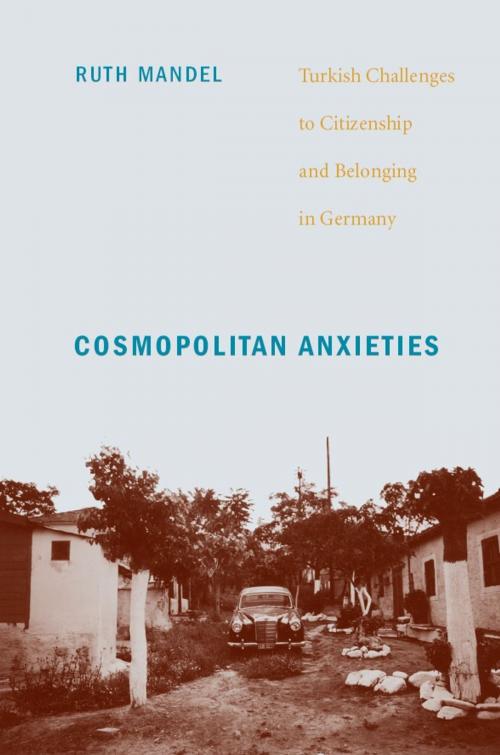Cosmopolitan Anxieties
Turkish Challenges to Citizenship and Belonging in Germany
Nonfiction, Social & Cultural Studies, Social Science, Cultural Studies, Emigration & Immigration, Discrimination & Race Relations, Anthropology| Author: | Ruth Mandel | ISBN: | 9780822389026 |
| Publisher: | Duke University Press | Publication: | July 4, 2008 |
| Imprint: | Duke University Press Books | Language: | English |
| Author: | Ruth Mandel |
| ISBN: | 9780822389026 |
| Publisher: | Duke University Press |
| Publication: | July 4, 2008 |
| Imprint: | Duke University Press Books |
| Language: | English |
In Cosmopolitan Anxieties, Ruth Mandel explores Germany’s relation to the more than two million Turkish immigrants and their descendants living within its borders. Based on her two decades of ethnographic research in Berlin, she argues that Germany’s reactions to the postwar Turkish diaspora have been charged, inconsistent, and resonant of past problematic encounters with a Jewish “other.” Mandel examines the tensions in Germany between race-based ideologies of blood and belonging on the one hand and ambitions of multicultural tolerance and cosmopolitanism on the other. She does so by juxtaposing the experiences of Turkish immigrants, Jews, and “ethnic Germans” in relation to issues including Islam, Germany’s Nazi past, and its radically altered position as a unified country in the post–Cold War era.
Mandel explains that within Germany the popular understanding of what it means to be German is often conflated with citizenship, so that a German citizen of Turkish background can never be a “real German.” This conflation of blood and citizenship was dramatically illustrated when, during the 1990s, nearly two million “ethnic Germans” from Eastern Europe and the former Soviet Union arrived in Germany with a legal and social status far superior to that of “Turks” who had lived in the country for decades. Mandel analyzes how representations of Turkish difference are appropriated or rejected by Turks living in Germany; how subsequent generations of Turkish immigrants are exploring new configurations of identity and citizenship through literature, film, hip-hop, and fashion; and how migrants returning to Turkey find themselves fundamentally changed by their experiences in Germany. She maintains that until difference is accepted as unproblematic, there will continue to be serious tension regarding resident foreigners, despite recurrent attempts to realize a more inclusive and “demotic” cosmopolitan vision of Germany.
In Cosmopolitan Anxieties, Ruth Mandel explores Germany’s relation to the more than two million Turkish immigrants and their descendants living within its borders. Based on her two decades of ethnographic research in Berlin, she argues that Germany’s reactions to the postwar Turkish diaspora have been charged, inconsistent, and resonant of past problematic encounters with a Jewish “other.” Mandel examines the tensions in Germany between race-based ideologies of blood and belonging on the one hand and ambitions of multicultural tolerance and cosmopolitanism on the other. She does so by juxtaposing the experiences of Turkish immigrants, Jews, and “ethnic Germans” in relation to issues including Islam, Germany’s Nazi past, and its radically altered position as a unified country in the post–Cold War era.
Mandel explains that within Germany the popular understanding of what it means to be German is often conflated with citizenship, so that a German citizen of Turkish background can never be a “real German.” This conflation of blood and citizenship was dramatically illustrated when, during the 1990s, nearly two million “ethnic Germans” from Eastern Europe and the former Soviet Union arrived in Germany with a legal and social status far superior to that of “Turks” who had lived in the country for decades. Mandel analyzes how representations of Turkish difference are appropriated or rejected by Turks living in Germany; how subsequent generations of Turkish immigrants are exploring new configurations of identity and citizenship through literature, film, hip-hop, and fashion; and how migrants returning to Turkey find themselves fundamentally changed by their experiences in Germany. She maintains that until difference is accepted as unproblematic, there will continue to be serious tension regarding resident foreigners, despite recurrent attempts to realize a more inclusive and “demotic” cosmopolitan vision of Germany.















